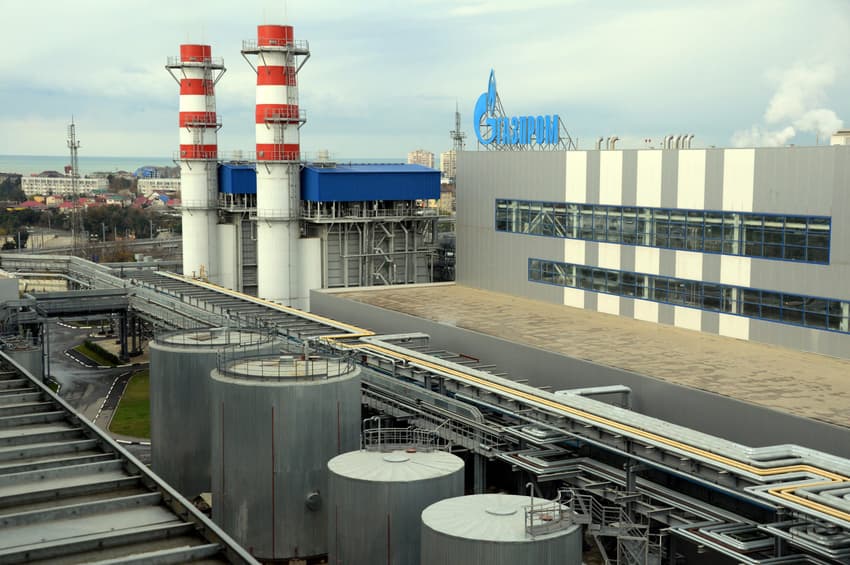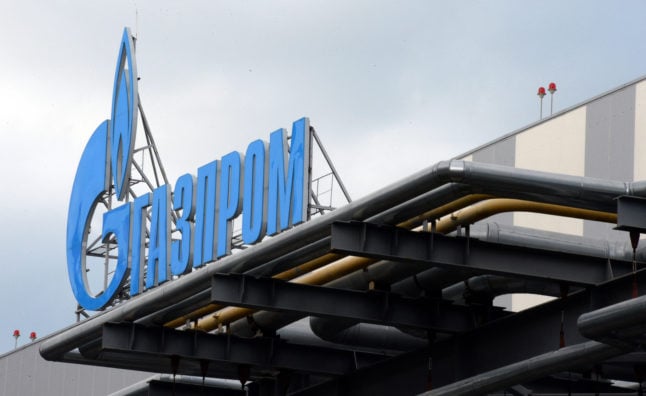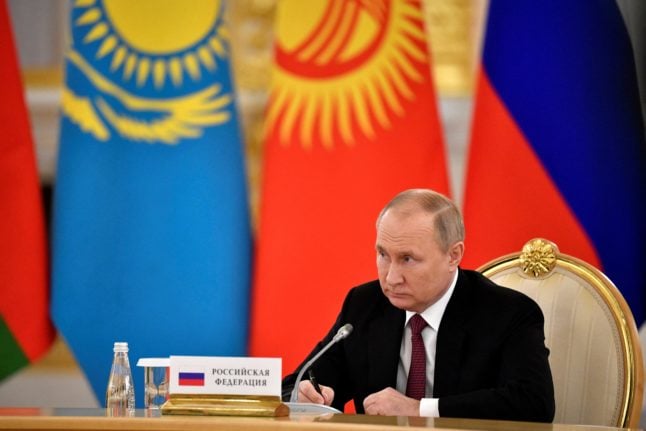Explained: Why and how Italy will pay for Russian gas in rubles

Italy has said it will comply with Moscow's demand to pay for its gas exports in rubles - so what does that mean exactly? Here's what you need to know.
What's going on?
At the end of March, Vladimir Putin issued a demand for countries deemed 'unfriendly' to Russia - including all EU member states - to start paying for Russian gas in rubles.
Poland and Bulgaria refused to comply, and Putin cut off their gas supply in retaliation. Finland has said it will join them, and is prepared to lose its own supply as as result.
READ ALSO: Italian energy company to start paying for Russian gas in rubles
Other European countries have been slower to resist. Hungary almost immediately accepted Moscow's demands, and both France and Germany recently said that they had reached compromises that would allow them to continue receiving Russian gas without breaching EU sanctions.
The Italian energy company Eni, which is 30 percent owned by the Italian state, said in a statement on Tuesday that it was opening separate accounts in both rubles and euros with Russia's Gazprombank “on a precautionary basis” in order to maintain its gas supply from Russia.
How would the payments work, and how is this different to what's already in place?
EU countries would technically still be paying Russia in euros, but then authorising Gazprom’s bank to convert the payments into rubles under a system devised by Russia as a workaround that appears to circumvent sanctions.
Here's the system Moscow's proposing: foreign companies open two accounts with Gazprombank, the Russia's third largest bank and the financial arm of the state-owned energy company Gazprom.
The foreign company would pay into the first account, in the currency stipulated in its contract with Gazprom (almost always euros or US dollars), but would authorise Gazprombank to convert the sum into rubles on the Moscow Stock Exchange.

Gazprom's logo on the Adler thermal power plant in Sochi. Putin has demanded that EU countries pay Gazprom in rubles. Photo by YURI KADOBNOV / AFP.
Gazprombank would then move the sum into the second account and make the payment to Gazprom in rubles, at which point the transaction would be considered complete.
Currently, 97 percent of all EU company contracts with Gazprom are in euros or dollars, according to Reuters. Usually, foreign companies would simply pay the energy giant directly in one of these currencies without going through these extra steps.
Why is Italy acceding to Putin's demands?
Italy is highly dependent on Russian gas. 95 percent of its gas supply comes from imports, and 40 percent of these are from Russia.
The country has tried to transition to other sources, most recently signing a deal to boost its gas supplies from Algeria. But despite its best efforts, Italy doesn't anticipate being able to wean itself off Russian gas until 2025.
Eni CEO Claudio Descalzi had initially rejected Russia's conditions, but on Tuesday the company announced that it had revised its position, saying the decision to open the accounts with Gazprombank was “taken in compliance with the current international sanctions framework”.
Is it a violation of EU sanctions?
The EU seems to be equivocating about whether the scheme is in breach of the bloc's sanctions against Russia.
On May 13th, the European Commission reportedly issued revised guidelines to member states indicating that they could continue buying Russian gas without violating EU rules - but didn't address Russia's demand that buyers open an account in rubles.
READ ALSO: Italy builds first offshore wind farm amid push for energy independence

The EU has yet to issue clear guidance on whether complying with Putin's demands would breach its sanctions. Photo by Alexander NEMENOV / POOL / AFP.
On Wednesday, however, Commission Vice President Frans Timmerman warned Italy that opening the two accounts was breaking the EU's rules, calling it "a breach of the stipulated contracts, which say what currency to pay in... The contracts say euros or dollars, never rubles."
Italy's Prime Minister Mario Draghi had called on the Commission to clarify its position earlier this month, saying "if there is not clarity or a line of conduct then it is clear that each company or each country will do as it believes fit.”
Why does Putin want to be paid in rubles?
To shore up Russia's struggling economy by creating more demand for the currency, boosting its value.
By March 7th, just days after Russia began its invasion of Ukraine, the ruble's value had plummeted by 45 percent. When Putin issued his ultimatum, it quickly rose again - though remained at 22 percent below its value of before February 24th.
The demand has also had the convenient side effect of creating chaos and sowing discord in Europe, as different EU member states with varying degrees of dependency on Russian gas have very different ideas about how the bloc should respond to Moscow's demands.
How will this affect people living in Italy?
If Italy is allowed to go ahead with Russia's scheme - as it has already started doing - people in Italy are likely to be unaffected by the change.
Italy would still be paying the amount prescribed in its contracts, in the currency agreed upon in the contracts, so the price paid by the end consumer would remain the same.
READ ALSO: Italy extends energy bill discount and petrol tax cuts
If the EU bars member states from complying with Russia's demands, countries like Italy and Germany that are particularly dependent on Russian gas will be left scrambling to come up with alternative energy sources faster than they anticipated - which is likely why Brussels has been hesitant about issuing an outright ban.
Comments (1)
See Also
What's going on?
At the end of March, Vladimir Putin issued a demand for countries deemed 'unfriendly' to Russia - including all EU member states - to start paying for Russian gas in rubles.
Poland and Bulgaria refused to comply, and Putin cut off their gas supply in retaliation. Finland has said it will join them, and is prepared to lose its own supply as as result.
READ ALSO: Italian energy company to start paying for Russian gas in rubles
Other European countries have been slower to resist. Hungary almost immediately accepted Moscow's demands, and both France and Germany recently said that they had reached compromises that would allow them to continue receiving Russian gas without breaching EU sanctions.
The Italian energy company Eni, which is 30 percent owned by the Italian state, said in a statement on Tuesday that it was opening separate accounts in both rubles and euros with Russia's Gazprombank “on a precautionary basis” in order to maintain its gas supply from Russia.
How would the payments work, and how is this different to what's already in place?
EU countries would technically still be paying Russia in euros, but then authorising Gazprom’s bank to convert the payments into rubles under a system devised by Russia as a workaround that appears to circumvent sanctions.
Here's the system Moscow's proposing: foreign companies open two accounts with Gazprombank, the Russia's third largest bank and the financial arm of the state-owned energy company Gazprom.
The foreign company would pay into the first account, in the currency stipulated in its contract with Gazprom (almost always euros or US dollars), but would authorise Gazprombank to convert the sum into rubles on the Moscow Stock Exchange.

Gazprombank would then move the sum into the second account and make the payment to Gazprom in rubles, at which point the transaction would be considered complete.
Currently, 97 percent of all EU company contracts with Gazprom are in euros or dollars, according to Reuters. Usually, foreign companies would simply pay the energy giant directly in one of these currencies without going through these extra steps.
Why is Italy acceding to Putin's demands?
Italy is highly dependent on Russian gas. 95 percent of its gas supply comes from imports, and 40 percent of these are from Russia.
The country has tried to transition to other sources, most recently signing a deal to boost its gas supplies from Algeria. But despite its best efforts, Italy doesn't anticipate being able to wean itself off Russian gas until 2025.
Eni CEO Claudio Descalzi had initially rejected Russia's conditions, but on Tuesday the company announced that it had revised its position, saying the decision to open the accounts with Gazprombank was “taken in compliance with the current international sanctions framework”.
Is it a violation of EU sanctions?
The EU seems to be equivocating about whether the scheme is in breach of the bloc's sanctions against Russia.
On May 13th, the European Commission reportedly issued revised guidelines to member states indicating that they could continue buying Russian gas without violating EU rules - but didn't address Russia's demand that buyers open an account in rubles.
READ ALSO: Italy builds first offshore wind farm amid push for energy independence

On Wednesday, however, Commission Vice President Frans Timmerman warned Italy that opening the two accounts was breaking the EU's rules, calling it "a breach of the stipulated contracts, which say what currency to pay in... The contracts say euros or dollars, never rubles."
Italy's Prime Minister Mario Draghi had called on the Commission to clarify its position earlier this month, saying "if there is not clarity or a line of conduct then it is clear that each company or each country will do as it believes fit.”
Why does Putin want to be paid in rubles?
To shore up Russia's struggling economy by creating more demand for the currency, boosting its value.
By March 7th, just days after Russia began its invasion of Ukraine, the ruble's value had plummeted by 45 percent. When Putin issued his ultimatum, it quickly rose again - though remained at 22 percent below its value of before February 24th.
The demand has also had the convenient side effect of creating chaos and sowing discord in Europe, as different EU member states with varying degrees of dependency on Russian gas have very different ideas about how the bloc should respond to Moscow's demands.
How will this affect people living in Italy?
If Italy is allowed to go ahead with Russia's scheme - as it has already started doing - people in Italy are likely to be unaffected by the change.
Italy would still be paying the amount prescribed in its contracts, in the currency agreed upon in the contracts, so the price paid by the end consumer would remain the same.
READ ALSO: Italy extends energy bill discount and petrol tax cuts
If the EU bars member states from complying with Russia's demands, countries like Italy and Germany that are particularly dependent on Russian gas will be left scrambling to come up with alternative energy sources faster than they anticipated - which is likely why Brussels has been hesitant about issuing an outright ban.
Join the conversation in our comments section below. Share your own views and experience and if you have a question or suggestion for our journalists then email us at [email protected].
Please keep comments civil, constructive and on topic – and make sure to read our terms of use before getting involved.
Please log in here to leave a comment.